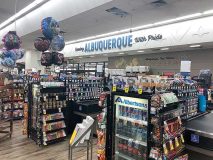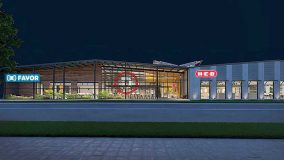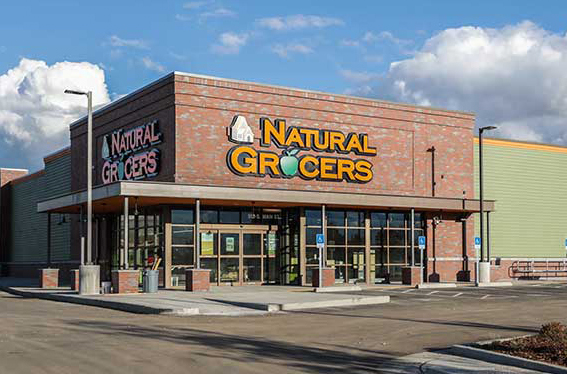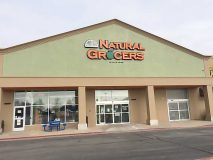A super buy, first-ever closure and a great American is honored in Oklahoma
There were some unexpected closures in 2018 brought to readers by Natural Grocers and Sam’s Club. Down in San Antonio, H-E-B has delved deep into high-tech with its acquisition of on-demand delivery service Favor and upcoming tech facility and innovation lab for its H-E-B Digital team. The United Family opened a “next generation” Albertsons Market in Albuquerque. Come January, there will be big changes in Colorado for grocers who want to sell alcohol.
These are some of the stories we felt helped tell the tale of the retail grocery business in the Southwest in 2018.
Fiesta Mart acquisition creates large Hispanic-focused supermarket company
In a move that created one of the largest Hispanic-focused supermarket companies in the U.S., Bodega Latina Corp. doing business as El Super—a U.S. Hispanic grocer and a subsidiary of Grupo Comercial Chedraui—said in March that it was acquiring Fiesta Mart. Fiesta, a portfolio company of ACON Investments, is based in Texas and offers international foods with an emphasis on the Hispanic segment. At the time of the acquisitions, it operated 63 stores primarily in the Dallas and Houston areas.
 Bodega Latina and Fiesta have a combined 122 stores in California, Arizona, Nevada, New Mexico and Texas and revenues of approximately $3 billion. More than half of the fast-growing U.S. Hispanic population resides within the five states in which the combined company operates.
Bodega Latina and Fiesta have a combined 122 stores in California, Arizona, Nevada, New Mexico and Texas and revenues of approximately $3 billion. More than half of the fast-growing U.S. Hispanic population resides within the five states in which the combined company operates.
“The acquisition brings together best-in-class practices across both retailers to further enhance the customer shopping experience via improved pricing, quality and customer service,” the companies said in a statement.
Fiesta Mart stores continue to be operated under their own banner. On Nov. 14, a grand reopening was held for the Fiesta at 8710 Bellaire in Houston.
“The acquisition of Fiesta allows us to meaningfully expand into Texas via an established, well-known supermarket operator,” said Bodega Latina President and CEO Carlos Smith when the acquisition was announced. “Through the combination of the strengths of our two organizations, we will be well positioned to significantly accelerate our vision of efficiently offering high-quality products at the lowest possible prices. We believe this transaction will be beneficial for all of our stakeholders, including customers, suppliers, employees and vendors. We look forward to welcoming Fiesta’s talented employees and working together to create the premier Hispanic grocery retailer.”
 “Combining the strengths of Bodega Latina with those of Fiesta will accelerate the evolution and growth of Fiesta through combining the parties’ scale, geographic reach, talented teams and market knowledge,” said Sid Keswani, CEO of Fiesta. “Our team members are excited about becoming part of the Bodega Latina family and continuing to grow the combined company.”
“Combining the strengths of Bodega Latina with those of Fiesta will accelerate the evolution and growth of Fiesta through combining the parties’ scale, geographic reach, talented teams and market knowledge,” said Sid Keswani, CEO of Fiesta. “Our team members are excited about becoming part of the Bodega Latina family and continuing to grow the combined company.”
José Antonio Chedraui Eguía, CEO of Chedraui, added, “We are excited about the combination of Bodega Latina and Fiesta, which further expands our U.S. footprint. Grupo Comercial Chedraui is committed to growing our U.S. business both organically and through acquisition.”
Bodega Latina entered the grocery retail marketplace with its first El Super store in South Gate, California in 1997. The company is headquartered in Paramount, California.
Texas-based Fiesta Mart was co-founded by Donald Bonham and O.C. Mendenhall in Houston in 1972. It serves customers from more than 100 countries of origin with an assortment of dry grocery and perishable products, including fresh meat, seafood, grocery, produce, dairy products, beer and wines.
 For the first time in its history, Natural Grocers shutters a store
For the first time in its history, Natural Grocers shutters a store
Natural Grocers closed its store at 9137 East 71st Street in Tulsa, Oklahoma, in November. Closing the Tulsa-Central store marks Natural Grocers’ first-ever store closure since the company was founded in 1955. The Lakewood, Colorado-based retailer said it has no plans to close any additional stores.
Natural Grocers said the decision to close the Tulsa-Central store “reflects that store’s financial performance and the company’s ongoing efforts to enhance operating efficiencies across its store base.”
Natural Grocers’ other store in Tulsa, located at 3126 South Harvard Avenue—less than eight miles from the Tulsa-Central store—remains open. Natural Grocers says it believes that store can effectively serve the Tulsa market.
Also in 2018, Natural Grocers increased the minimum pay for workers at all company stores to $11 per hour. The minimum pay increase applies to both part-time and full-time workers—approximately 700 employees, the company says.
“This decision is a reflection of our continued commitment to our employees,” said Kemper Isely, Natural Grocers co-president. “It has always been our policy to offer pay that is above the legally mandated minimum wage.”
Isely added that the increase puts Natural Grocers’ pay at the forefront of the grocery industry.
Albertsons Market unveils remodeled ‘next-gen’ Albuquerque store
Albertsons Market on May 2 celebrated the completion of a large-scale remodel of its Albuquerque, New Mexico, store located at 10131 Coors Boulevard. The “next-generation” Albertsons Market features an expanded variety of prepared foods and a dining area adjacent to a full-service Starbucks for guests who wish to dine-in.
Additional store features include fresh sushi made in-store daily; a salad, soup and wing bar; thousands of organic items throughout the store; and an expanded selection of local and international wines and craft beer.
 “We are so proud to have a location of this caliber in our family of stores in Albuquerque,” said Travis Chaney, regional VP for The United Family. “The investment we’ve made in equipment, people, products and service offerings is a game-changer for area grocery stores, and we’re thrilled to unveil it today.”
“We are so proud to have a location of this caliber in our family of stores in Albuquerque,” said Travis Chaney, regional VP for The United Family. “The investment we’ve made in equipment, people, products and service offerings is a game-changer for area grocery stores, and we’re thrilled to unveil it today.”
The location also features Streetside, Albertsons Market’s online grocery shopping service.
Albertsons Market operates stores in nine cities across New Mexico—Alamogordo, Albuquerque, Carlsbad, Clovis, Hobbs, Roswell, Ruidoso, Santa Fe and Taos—as well as Midland and Odessa, Texas. Albertsons Market is operated by The United Family, which is a wholly owned subsidiary of the Albertsons Cos.
H-E-B to develop Austin tech facility and innovation lab

H-E-B has signed a long-term lease for a building in East Austin, where the largest privately-held employer in Texas will develop a tech facility and innovation lab for its growing H-E-B Digital team and its wholly owned subsidiary, Favor, the Austin-based on-demand delivery service. H-E-B acquired Favor earlier this year.
Set for completion in spring 2019, H-E-B will turn the recently renovated industrial warehouse into a creative and collaborative workspace for Austin-based employees of the H-E-B Digital team as well as Favor’s corporate headquarters. H-E-B has engaged global architecture firm, IA Interior Architects, to fully customize the two-story, 81,000-s.f. facility. Located at 2416 East Sixth Street, the property is walking distance to amenities like restaurants, breweries, coffee shops and the 7th Street H-E-B store.
“This state-of-the-art space will be a hub for creativity and innovation as we continue to develop the ultimate digital experience for our customers,” said Jag Bath, H-E-B chief digital officer and Favor president and CEO. “Bringing H-E-B and Favor closer together will allow us to promote collaboration between our two companies as we strengthen our commitment to building out H-E-B’s omnichannel services.”
H-E-B operates 400 stores in Texas and Mexico. Its sales are $25 billion. Founded in 2013, Favor has expanded its presence to 50 cities in Texas. In 2017, Favor more than doubled its footprint across the state and became the first U.S. on-demand delivery company to achieve profitability at scale.
Sam’s Club closes 63 U.S. stores
Early in the year, Sam’s Club abruptly closed 63 clubs around the country. The Walmart Stores division said it took the action after a thorough performance review. Local and national news outlets across the country reported that employees showed up to work only to find the Sam’s Club closed and a notice posted about the closure.
“Transforming our business means managing our real estate portfolio, and Walmart needs a strong fleet of Sam’s Clubs that are fit for the future,” said John Furner, president and CEO of Sam’s Club. “We know this is difficult news for our associates, and we are working to place as many of them as possible at nearby locations. Our focus today has been on those associates and their communities, and communicating with them.”
Most of the stores would close but Sam’s Club planned to convert up to 12 of the impacted clubs to e-commerce fulfillment centers in a move the retailer said will speed delivery of online orders. The first of these converted e-commerce fulfillment centers was in Memphis, Tennessee. Another has opened in Chicagoland. Other potential sites for fulfillment centers include Texas, central Florida, the mid-Atlantic, Southern California and the Northeast.
Editor’s note: The following article was written by Mary Lou Chapman, president of the Rocky Mountain Food Industry Association. It appeared in the September issue of The Shelby Report of the Southwest. It has been edited due to space constraints.
Colorado alcoholic beverage sales changes took effect Jan. 1

For the past several years, issues surrounding beer, wine and spirits sales in grocery and convenience stores have consumed an inordinate amount of time prior to and during Colorado legislative sessions. 2018 was no different. Following the passage of a last-minute bill in 2016 that would overhaul the entire system of laws related to the alcoholic beverages, all parties meet regularly with the Liquor Enforcement Division (LED) to iron out details before the bill took effect on Jan. 1, 2019.
The act, as signed into law, now has the following provisions:
• Permits full-strength beer sales in all existing grocery and convenience stores, without distance restrictions to liquor stores or schools. It requires that new convenience and grocery stores wishing to sell those beverages be at least 500 feet from an existing liquor store;
• Allows clerks as young as 18 to sell full-strength beer, wine or spirits at grocery, convenience and liquor stores, down from the previously required age of 21 for such sales;
• Requires new grocery and convenience stores that wish to sell full-strength beer to derive at least 20 percent of their revenue from food sales. Existing grocery and convenience stores are grandfathered in to sell beer regardless of their income breakdown;
• Allows full-strength beer sellers to deliver beer to customers, provided they sell at least 50 percent of their alcohol from a brick-and-mortar location and use company employees in company vehicles to make the deliveries. This provision was added by legislators with the intention of trying to stop Amazon from taking over the local liquor-delivery market;
• Bans any full-strength-beer sellers from selling beer at below-cost prices;
• Allows Walmart, which had been left out of the original bill in 2016 permitting expanded grocery store alcohol sales, to get the same extra 19 licenses over the next 19 years as was provided for other chain food stores; and
• Allows local governments and the Colorado Division of Wildlife to decide what kind of alcohol consumption will be allowed in public parks, since state law previously had limited such consumption to low-strength beer.
Ground broken in North Houston for new grocers supply distribution center
Real estate investment trust Liberty Property Trust broke ground on a 727,600-s.f. distribution center at 14803 Woodham Drive in North Houston this year for a build-to-suit project for Grocers Supply, a division of C&S Wholesale Grocers, which has signed a long-term lease.
Operations at the DC are expected to begin in the second quarter of 2019.

(Photo: Facebook/ @LibPropTrust)
“This project will consolidate several buildings into one state-of-the-art facility, thereby enhancing our ability to provide efficient and timely distribution throughout the market,” said Max Henderson, Grocers Supply president. “This long-term investment demonstrates Grocers Supply’s commitment to our highly valued customers as well as growing our business in the years to come.”
The 540-ft. deep building with 40-ft. clear height will include 65-ft. speed bays, 75 dock doors, and parking for 211 trailers and 667 cars. Two pre-engineered metal buildings for maintenance and pallet stripping (24,870- and 20,020-s.f., respectively) are being developed as part of the project.
Grocers Supply also purchased 34 acres of land adjacent to the project.
NGA presents Great American Award to Doc’s Food Stores president
The National Grocers Association has recognized Jim Brown, president of Doc’s Food Stores, with the Clarence G. Adamy Great American Award, the association’s highest honor for government relations and public affairs efforts. The award was presented on May 1 by NGA EVP Greg Ferrara during the Oklahoma Grocers Association Chairman’s Dinner in Oklahoma City.
“Jim Brown is one of those members who constantly goes above and beyond to help NGA get wins for the independent supermarket industry,” said Ferrara. “Whether it’s bringing a delegation of retailers to Washington, D.C., each year or hosting elected officials in his store, Jim is focused on building relationships and helping policymakers understand the important role independent supermarkets play across Oklahoma and the nation.

Greg Ferrara.
“NGA’s member companies are dedicated and committed to the success of the industry, and NGA is proud to be the voice of independent grocers. We are lucky to have people like Jim, who are tireless advocates for our industry’s public policy agenda and have helped build NGA into the respected organization that it is today. Simply put, our industry is better today because of the work of people like Jim Brown.”
Established in 1982, the Clarence G. Adamy Great American Award is NGA’s most distinguished government relations award that is presented to an individual or company whose leadership in the food industry best exemplifies active and effective participation in government relations as a citizen and industry representative. Public affairs participation is a broad concept reflecting service to people as a whole or the community at large. Service may include but is not limited to charitable, political, educational or other activities establishing exemplary leadership on behalf of the food industry.
The award’s namesake, Clarence Adamy, was a past president of the National Association of Food Chains and was active in public and government affairs, having served as patronage chief and personnel director of the Republican National Committee during the Eisenhower Years in the 1950s and as a member of the Bradley Commission in 1956 that made Veteran Pension recommendations. He was highly regarded due to his advocacy on behalf of the industry when it was facing government investigations concerning pricing during an inflation period in the 1970s, says NGA.
Dallas Fresh Food Association opens membership, names first board
 The Dallas Fresh Food Association (DFFA), a new association dedicated to raising the profile of fresh food in North Texas—including showcasing careers, food education and increasing consumption—has named its board of directors for 2018. Additionally, the association is encouraging local companies and their employees to become members.
The Dallas Fresh Food Association (DFFA), a new association dedicated to raising the profile of fresh food in North Texas—including showcasing careers, food education and increasing consumption—has named its board of directors for 2018. Additionally, the association is encouraging local companies and their employees to become members.
This year’s board members include: President—Dale Long of North Texas Food Bank; Treasurer—Michael Grinstead of The Grinstead Group; Marketing—Beth Keeton of DMA Solutions; Membership—Steve Monson of C.H. Robinson; Philanthropy—Lucian LaBarba of Ben E. Keith; and Technology—Bobby Grinstead of FreightFlow.
“The value of having a local association dedicated to serving the DFW area means being able to connect with and train the future leaders of the fresh food industry while empowering our community to choose more fresh food,” said Long. “In order to truly impact DFW the way we know it desperately needs is to activate our individual talents together to create hands-on opportunities that make an impact across the very areas that we serve in our businesses.”
Focused on “careers and consumption” in the North Texas region, the DFFA’s immediate goals in 2018 are to create networking opportunities for local fresh food professionals through monthly luncheons with guest speakers, as well as local outreach opportunities to support food education in areas that are underserved.
Founding members of the association include Ben E. Keith, Del Monte Fresh, DMA Solutions, Hardie’s Fresh Foods, Kroger, North Texas Food Bank, Robinson Fresh, Sunfed and The Grinstead Group.



 For the first time in its history, Natural Grocers shutters a store
For the first time in its history, Natural Grocers shutters a store